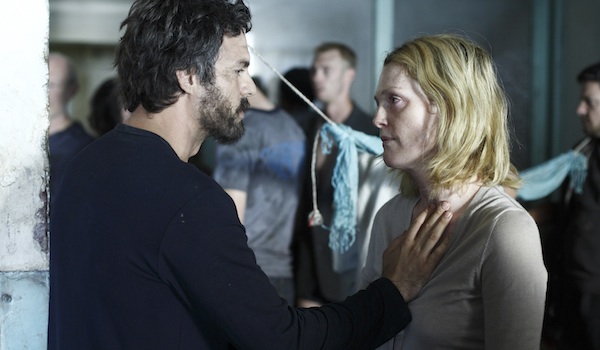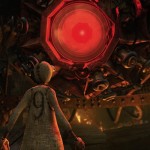Blindness Review
I recently noted in my review of “Mutiny on the Bounty” that when films play without subtlety, it can either work or fall on its face. “Mutiny on the Bounty” worked. The time period and setting all appropriated themselves to the way in which director Frank Lloyd elected to tell his story: with one man being pure evil and another being wholly good. Fernando Meirelles’s “Blindness” is an example of a film doing something similar and falling on its face. This is epically bad stuff. As intriguing as the premise is, almost nothing in its execution works. It skirts around some issues while showing others in an exploitative fashion. It features some beyond-irritating visual and aural flourishes. It goes on way too long, and it features an ending that almost insults our intelligence and makes us ask why we just spent the last two hours watching this.
The film opens with a man (Yusuke Iseya) suddenly going blind while driving his car. We see all the people whom he encounters once going blind. He goes to visit a optometrist (Mark Ruffalo). There, he comes across a prostitute (Alice Braga), a young boy (Mitchell Nye), and an old man with an eye patch (Danny Glover). The doctor goes home to his wife (Julianne Moore) perplexed about the strange ailment the man came to him with. He doesn’t give it much more thought until the morning when he realizes it’s an infection which has spread to him. The doctor is blind and is concerned about his wife’s sight. Somehow, she never becomes infected, but she chooses to pretend to be blind so she can accompany her husband to the quaratines/concentration camps in which the infected will be housed.
Everyone who the first man came across eventually makes his or her way to the ward. There are others who become infected too, and they don’t have the same “one-for-all, all-for-one” attitude as our heroes. One man (Gael Garcia Bernal) in particular is in self-preservation mode, and when he gets control of a gun, he dubs himself king and starts charging the blind people for rations. First, the must give up their valuables; next, their bodies. But the king doesn’t know there is one weapon that trumps his gun, and the doctor’s wife possess it.
I hardly know where to begin. Easily the most frustrating part about the film is the ending, but perhaps I’ll list the flaws in the order in which they appear. So firstly, the film chooses not to name its characters. Maybe Meirelles is taking a cue from the book upon which the film is based, but it’s symbolic of a larger problem. We don’t care one iota about these characters. Some are caricatures; others are just supremely underdeveloped. At one point near the conclusion, one character remarks to another that he doesn’t want to know anything about her (his reason being he has formed a picture of her in his head). At that point in the film, I sort of felt the same way.
As unconnected as we are to the characters, some of the things we have to see them do are just cruel. When The King demands women in exchange for food, we are forced to watch one of the most brutal scenes in recent memory. It’s doesn’t stir up any emotion, however (maybe just queasiness). I’m not sure if that’s a result of the poor character development or if Meirelles just executed the scene poorly, but it doesn’t work, despite the fact that it should’ve been one of the film’s most emotional scenes.
Meirelles’s visual technique is also a major problem. The blindness as described in the film is that of intense whiteness, and the director attempts to simulate this throughout the film by saturating many frames with white. It looks interesting, but doesn’t enhance the story at all, just distracts us. Perhaps more annoying are his audio flourishes. He introduces many scenes with a very high-pitched sound which hurt my ears for no discernable reason.
Near the 80-minute mark, the film takes an abrupt turn away from the wards and into the real world. I didn’t understand why Meirelles went in this direction. The ward stuff, while executed in a poor fashion, was at least moderately interesting. After the characters leave, the film gets dreadfully dull and seems to go on forever.
But nothing in the first 110 minutes can prepare you for the anger you feel as a result of the film’s ending. What was the point of it? Please someone explain it to me. We got no explanation and didn’t learn any lesson. I despised it.
As I’ve said, Meirelles’s direction was a disaster. The acting isn’t as bad, but doesn’t do anything to enhance the film. Julianne Moore is one of the finest actresses working today, but this has to be one of her worst performances. She doesn’t bring anything remotely interesting to her character, who is supposed to be our eyes into this dark world and a hero to those around her. Mark Ruffalo is one-note throughout. Danny Glover literally does nothing. Nobody else is really worth mentioning.
If you couldn’t guess, I hated this film. I rarely watch stuff this bad because if I think it’s going to be this bad, I wouldn’t bother with it. “Blindness” was uniformly dismissed upon its release in 2008. It’s been universally forgotten ever since. I should’ve listened to everyone else and avoided this stinker. I caution you all to do just that.
















